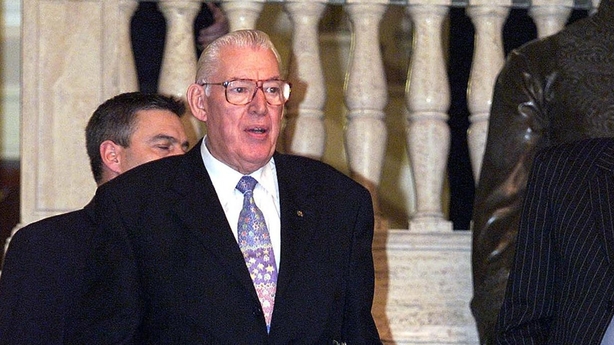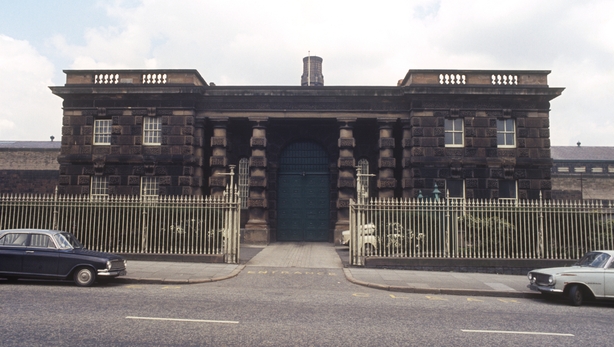Hundreds of British government files on Northern Ireland from 1995 have been declassified.
They give details of Martin McGuinness's involvement in talks with the Northern Ireland Office and the Irish Government during the ceasefire.
The files reveal that British officials thought former taoiseach Albert Reynolds' grasp on the realities of political life in Northern Ireland may have been uncertain.
They also show DUP proposals to introduce a curfew in the North during the Troubles were rejected by the British government.
Officials believed the Irish Government's decision to meet Gerry Adams after the IRA ceasefire showed "indecent haste".
Mr Reynolds shook hands with the Sinn Féin leader and SDLP leader John Hume following a meeting in Dublin a week after republicans laid down arms in August 1994.
Confidential briefings from the Northern Ireland Office (NIO) were released by the Public Records Office of Northern Ireland (Proni) today.
From the RTÉ Archives
The official records said a meeting between Mr Reynolds, Mr Adams and Mr Hume following the ceasefire was considered "to reflect indecent haste, although clearly designed to tie Adams into a process from which he personally would not be able to escape, no matter what the republican movement did".
The IRA had declared a ceasefire in August 1994, followed by the main loyalist paramilitaries in October that year.
It led to the beginning of public contact between the Irish and British governments and Sinn Féin.
Exploratory talks between the British government and Sinn Féin commenced before Christmas that year.
In February 1995, the two governments signed a frameworks document on the Northern Ireland peace process, which set out a number of guiding principles, including self-determination.
The files also show that DUP proposals for a curfew during the Troubles were rejected by the British government.
ID cards, beefed up border security and steps to seal off west Belfast would also have been adopted had the British government accepted former leader Ian Paisley's proposals.
The suggestions were discussed in an historical memo from Downing Street.
A letter from a Downing Street official said: "The arguments against a curfew were seen as primarily political, singling out part of the UK for special treatment and alienating those people most affected."
In 1992, DUP leader Ian Paisley also proposed the introduction of a "ring of steel".

The official memo said: "It was pointed out that the proposal by Mr Paisley on this in fact meant sealing off West Belfast.
"Some action to seal off areas was already undertaken.
"The kind of option Mr Paisley had in mind would not prevent arms being moved."
Border security was also considered.
The official wrote: "Closure of the border was extremely difficult, given the fact that some private land straddled the border, people living on one side went to school on the other."
Other files outline how a prisoner went on hunger strike to secure a vegan diet at HMP Belfast on the Crumlin Road in 1987.

The principal medical officer, MC Dickson, wrote: "In the past, when (name redacted) was previously a prisoner in both Maze and Magilligan, his constant demand was for raw vegetables.
"I can do no better than refer you to comments made on file by the late Dr Ross that Man is not a ruminant and thereby does not have the physical capacity in his stomach to break down the cellulose wall of the vegetables and thereby release the nutritious elements present.
"Rightly or wrongly, I feel prisoners, or indeed anyone else for that matter, should clearly understand that diets taken to extremes can have consequences which are not immediately predictable or controllable."
He said he could not agree to additionally providing vitamin supplements on a "guestimate" basis for what the authorities thought may happen.

